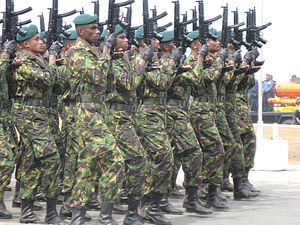The Associated Press recently published a very disturbing story about how UN peacekeepers from Sri Lanka ran a sex ring in Haiti some years ago. According to the piece, “[t]he Sri Lankan peacekeepers wanted sex from girls and boys as young as 12.”
More broadly, when these sorts of violations take place, perpetrators rarely face justice:
Justice for victims like V01 [Victim Number 1] is rare. An Associated Press investigation of UN missions during the past 12 years found nearly 2,000 allegations of sexual abuse and exploitation by peacekeepers and other personnel around the world — signaling the crisis is much larger than previously known. More than 300 of the allegations involved children, the AP found, but only a fraction of the alleged perpetrators served jail time.
Here’s more:
The AP interviewed alleged victims, current and former UN officials and investigators and sought answers from 23 countries on the number of peacekeepers who faced such allegations and, what if anything, was done to investigate. With rare exceptions, few nations responded to repeated requests, while the names of those found guilty are kept confidential, making accountability impossible to determine.
Additionally, in many instances, military personnel believed to be perpetrators stay in the military. The AP piece notes that “[s]ome of the peacekeepers involved in the ring were still in the Sri Lankan military as of last year, Sri Lankan military officials say. The United Nations, meanwhile, continued to send Sri Lankan peacekeepers to Haiti and elsewhere despite corroborating the child sex ring.”
Recent reporting suggests that 200 members of the Sri Lanka Army will join a UN peacekeeping mission in Mali imminently. Troublingly, there is no reason to believe that Sri Lanka is contemplating security sector reform. Let’s not forget that – in addition to the latest news about peacekeepers in Haiti – Sri Lanka’s military has been plagued by (among other serious violations) credible allegations of sexual violence that occurred during the end of the island’s civil war, during the years following the war and also since a new president, Maithripala Sirisena, was elected in January 2015.
When examining violations that have occurred within Sri Lanka, it’s particularly important to keep ethnicity in mind. The military is almost exclusively Sinhalese, yet most victims are Tamil, a numerical minority in the country.

































